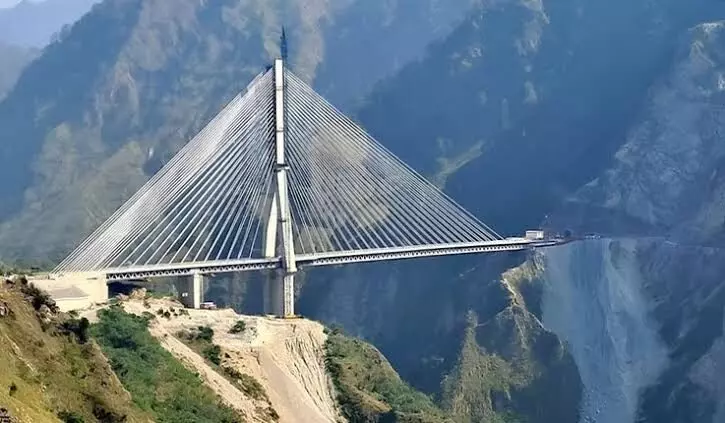India’s first cable-stayed rail bridge opens
PM Modi inaugurated the Chenab and Anji rail bridges and flagged off Vande Bharat Trains, enhancing connectivity within Jammu and Kashmir
By Newsmeter Network
India’s first cable-stayed rail bridge opens
Katra: India gets its first cable bridge as prime minister Narendra Modi inaugurated India’s first cable-stayed railway bridge, named Anji bridge. The PM also inaugurated the world’s highest railway bridge over the Chenab River.
The Prime Minister also laid the foundation stone and inaugurated multiple development projects worth over Rs 46,000 crore at Katra, Jammu & Kashmir on June 5.
PM Modi inaugurated the Chenab and Anji rail bridges and flagged off Vande Bharat Trains, enhancing connectivity within Jammu and Kashmir. PM Modi said, “We have always invoked Maa Bharati with deep reverence, saying from Kashmir to Kanyakumari. Today, this has become a reality as the Udhampur-Srinagar-Baramulla Rail Line Project connects both ends of India.”
The Chenab and Anji Rail bridges and Vande Bharat Trains were flagged off, enhancing the connectivity.
IISc professor Madhavi Latha worked on project
G Madhavi Latha, a rock engineering specialist and professor at the Indian Institute of Science (IISc), played a key role in the construction of the Chenab Rail Bridge.
The bridge was built on the rugged mountains of Pir Panjal mountains. The professor served as a consultant for slope stabilisation, bridge foundation and also advised railways on other aspects of engineering.
The Chenab Rail bridge is the world’s highest railway arch bridge and is built to withstand the harsh conditions.
Anji Bridge is the first cable-supported railway bridge in the country.
New medical college
PM Modi also laid the foundation stone for a new medical college in Katra worth Rs 350 crore. It is the first medical college in the Reasi district of Jammu.
PM Modi said, “Rs 46,000 crore worth of projects are being developed in Jammu and Kashmir that will drive progress and prosperity.”
Underlining that generations in Jammu and Kashmir had long dreamt of railway connectivity, referring to a recent statement by former chief minister Omar Abdullah, the prime minister Modi noted that even as a student in seventh or eighth grade, Abdullah had been anticipating the completion of this project. “The fulfilment of this long-awaited aspiration marks a historic moment for millions of people in J and K.”
About Chenab and Anji rail bridges
The Chenab and Anji Bridge are an engineering brilliance and unwavering dedication of India’s engineers and workers. The architectural marvel Chenab Rail Bridge, situated at a height of 359 meters above the river, is the world’s highest railway arch bridge.
It is a 1,315-metre-long steel arch bridge engineered to withstand seismic and wind conditions. A key impact of the bridge will be in enhancing connectivity between Jammu and Srinagar. Through the Vande Bharat train moving on the bridge, it will take just about 3 hours to travel between Katra and Srinagar, reducing the existing travel time by 2-3 hours.
Anji Bridge is the first cable-supported railway bridge in the country.
Connectivity projects and other development initiatives
Udhampur-Srinagar-Baramulla Rail Link (USBRL) project is 272 km long and is worth around Rs 43,780 crore including 36 tunnels (spanning 119 km) and 943 bridges. The project establishes all-weather, seamless rail connectivity between the Kashmir Valley and the rest of the country aiming to transform regional mobility and driving socio-economic integration.
The bridges are in the Pir Panjai mountains and they have been built with technology for the all-weather infrastructure project. The other project which is being taken up in J and K, is the Sonmarg Tunnel which will connect to Vaishno Devi temple. This will make it easy for pilgrims to travel.
Boost tourism in J&K
Prime Minister Modi said, “These landmark projects will not only boost tourism but also benefit various sectors of the economy, creating new opportunities for businesses and industries”. He highlighted that enhanced rail connectivity between Jammu and Kashmir will open new doors for local entrepreneurs, driving economic growth.”
PM Modi noted that Kashmir’s apples will now reach major markets across India at lower costs, making trade more efficient. Furthermore, dry fruits and Kashmir’s renowned Pashmina shawls, along with other traditional handicrafts, will now be easily transported to every corner of the country, strengthening the region’s artisanal industry.
The prime minister stated that this improved connectivity will also make travel more convenient for the people of Jammu and Kashmir, allowing smoother movement across different parts of India.
Road projects inaugurated
In a major boost to last-mile connectivity, especially in border areas, the prime minister laid the foundation stone and inaugurated various road projects. He laid the foundation stone of road widening project from Rafiabad to Kupwara on National Highway-701 and the construction of Shopian bypass road on NH-444 worth over Rs 1,952 crore.
He also inaugurated two flyover projects at Sangrama Junction on National Highway-1 in Srinagar and at Bemina Junction on National Highway-44. These projects will ease traffic congestion and enhance traffic flow for the commuters.
‘Self-glorification and self-publicity’
Speaking about PM Modi inaugurating the Chenab bridge in J&K on Friday, Congress MP Jairam Ramesh said, “The prime minister never acknowledges continuity in governance because he is perenially searching for self-glorification and self-publicity. The BrahMos missile is also an example of continuity in governance.”
“The Udampur-Srinagar-Baramulla railway project was sanctioned in March 1995 when PV Narasimha Rao was the Prime Minister. In March 2002, Atal Bihari Vajpayee declared it a national project when he was the Prime Minister. All contracts for the Chenab Bridge were awarded in 2005.
While today is an important day for the people of J&K and the Indian railways, governance in continuity has to be recognised. It is a collective achievement of the last 30 years. Successive prime ministers have worked to make these projects a reality,” said Ramesh.